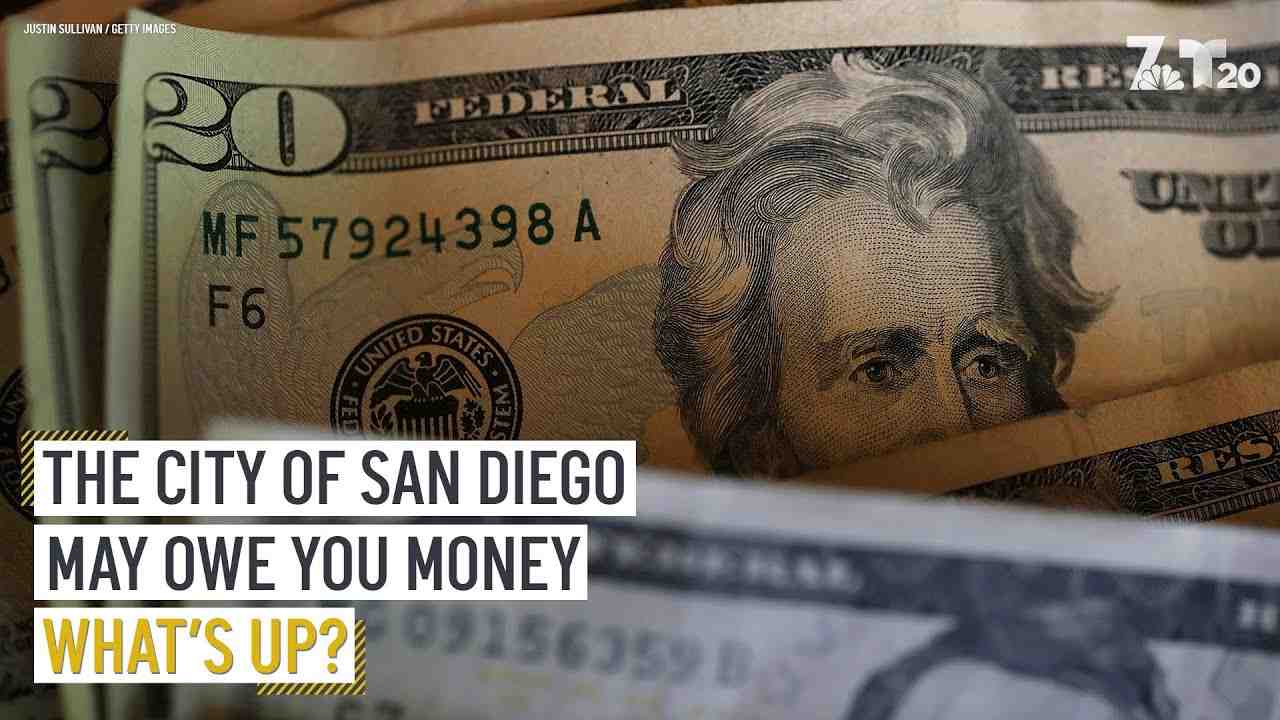The finance ministry says there are about $ 840,000 that can be returned for 1,070 residents and business owners. The most common reason why the city may owe you is overpaying taxes or utilities.
To see if your name is on the list, visit SanDiego.gov/finance/unclaimed. Searching for reports is free.
Get La Jolla Light weekly in your inbox
News, facilities and sports about La Jolla, free every Thursday
You may occasionally receive promotional content from the Del Mar Times.
There are some big names out there: Ace Parking is waiting for more than $ 2,000 to be raised; California Department of Fish and Wildlife, $ 2,406; Solana Beach Fire Service, $ 6,132; and the Downtown San Diego Partnership, $ 10,847.
Some people owe only $ 1, while one individual should get more than $ 100,000.
Companies and individuals who sit there before April 1, 2021, have until Monday, June 20, to submit a request or the money goes to the general fund of the city. The way it works is for the city to issue a check to someone who overpaid, and the date is next to the name on the list. Then that person has a year to send the application form to the city.
If your name is on the list, you can fill out the unsolicited money form on the website where the list is. Then it needs to be sent by mail to:
San Diego City Finance Department Undiscovered Money Request Processing 202 C St. – Mail Station 7ASan Diego, CA 92101
Only 42 percent of unsolicited money was returned last year. ◆
What is the IRS 6 year rule?

The six-year rule allows the payment of living expenses in excess of the CFS, and allows other expenses, such as minimum student loan or credit card payments, as long as the tax liability, including penalty and interest, can be paid in full in six years.
How far can the tax administration go to punish you? The tax administration is usually three years old. The comprehensive federal tax statute of limitations runs for three years after you file your tax return. If your tax return is due on April 15, but you file early, the statute begins to run exactly three years after the due date, not from the filing date.
Does the IRS only go back 6 years?
In general, the Tax Administration may include applications submitted in the last three years in the audit. If we find a significant error, we can add additional years. We don’t usually go back more than the last six years. The Tax Administration strives to audit tax returns as soon as possible after their submission.
Can the IRS collect after 6 years?
The statute of limitations for tax collection for the collection of taxes is generally ten (10) years. When the assessment is made, the tax administration generally has 10 years to initiate court proceedings and collect the tax debt using the significant funds at its disposal, which includes levies and seizures on salaries.
Do you still owe the IRS after 7 years?
Generally, the Tax Administration (IRS) has 10 years to collect unpaid tax debt. After that, the debt is deleted from its books and the tax administration writes it off. This is called the ten-year statute of limitations.
Can the IRS come after you after 7 years?
As a general rule, there is a ten-year statute of limitations for the collection of the tax administration. This means that the IRS can try to collect your unpaid taxes for up to ten years from the date they were assessed. With some important exceptions, when ten years have elapsed, the Tax Administration must suspend collection efforts.
How far back can the IRS go?
How far can the Tax Administration go in auditing my refund? In general, the Tax Administration may include applications submitted in the last three years in the audit. If we find a significant error, we can add additional years. We don’t usually go back more than the last six years.
How many years can the IRS go back for tax evasion?
The basic rule for the ability of the Tax Administration to look back and perform a tax audit is that the agency has three years from the date of your submission to audit your tax return for that year. However, taxpayers who do not include all sources of their income may have a longer period of time.
When was the 3rd stimulus check 2021?

Third round of stimulus checks: March 2021. On Thursday, March 11, Biden signed his U.S. rescue plan worth $ 1.9 billion. The third payment allowed individual taxpayers who qualify for a check up to $ 1,400, while couples applying together could receive a maximum of $ 2,800.
How much does the 3rd Stimulus Check 2021 cost? On March 11, 2021, President Biden signed the U.S. Rescue Plan Act. The provisions of the law allow for a third round of incentive checks worth $ 1,400 for each eligible person ($ 2,800 for couples), plus an additional $ 1,400 for each dependent.
When did 3rd stimulus check is coming?
CLEVELAND (WJW) – The third stimulus check was sent to U.S. eligible families beginning in March 2021 as part of the U.S. Rescue Plan Act.
How soon will we get 3rd stimulus check?
The Tax Administration began sending third payments for economic impact to eligible individuals in March 2021 and continued to send payments throughout the year as tax returns were processed. The Tax Administration issued all third payments for economic impact and related additional payments.
Was there a 3rd stimulus check?
The vast majority of third incentive payments were automatically delivered to taxpayers ’bank accounts or via a post office check last spring. The payments were approved by the American Rescue Plan in March 2021 and were aimed at helping people who are financially fighting the Covid-19 pandemic.
Was there a 3rd stimulus check?
The vast majority of third incentive payments were automatically delivered to taxpayers ’bank accounts or via a post office check last spring. The payments were approved by the American Rescue Plan in March 2021 and were aimed at helping people who are financially fighting the Covid-19 pandemic.
Are we getting our 3rd stimulus check?
The IRS will automatically send a third incentive payment to people who have filed a federal income tax return in 2019 or 2020. People who receive social security, additional insurance income, railway pension benefits or veterans’ benefits will also automatically receive a third payment.
Is there another 3rd stimulus check?
The IRS is sending another round of incentive payments. Here’s what you need to know about the third stimulus check with your name. The IRS began sending the third payout of incentive checks in series shortly after President Biden signed the U.S. Rescue Plan Act on March 11th.
What debts are forgiven at death?

What debt is forgiven when you die? Most debts must be paid through your property in the event of death. However, federal student loan debts and some private student loan debts may be forgiven if the primary borrower dies.
Do you inherit your parents’ debt? Again, the short answer is usually no. You generally do not inherit someone else’s debts in a way that you could inherit property or other assets from them. So, even if the debt collector tries to demand payment from you, there is no legal obligation to pay.
Is credit card debt forgiven upon death?
In most cases not. When you die, any credit card debt you owe is mostly paid from your property.
Do credit cards have to be paid after death?
If the deceased has no assets, the loved ones will not be directly responsible for paying the debt unless they are the joint owner of the credit card account of the deceased, according to the Consumer Financial Protection Bureau (CFPB). In some states, the surviving spouse may be liable.
Do credit card companies forgive debt after death?
Credit card debt after death: who is responsible and what is forgiven? After someone dies, their property is responsible for paying off all debts, including those on credit cards. Relatives are usually not responsible for using their own money to repay credit card debt after death.
What loans are not forgiven at death?
Mortgage Loans When You Die However, a mortgage loan is not forgiven when you die and you will have to pay it off. Your spouse or the person who inherits your house will usually have the option to take over the mortgage payment when you die.
What kind of debt doesn’t go away when you die?
In general, the property of the deceased is responsible for the payment of all unpaid debts. When a person dies, his property passes to his property. If there is no money or property, then the debt will generally not be paid. Generally, no one else is obligated to pay the debts of someone who has died.
Do loans get forgiven if you die?
If you have federal government loans, yes. This means that your property will not have to repay those student loans. Survivors can apply for a death grant in order to cancel the borrower’s federal student loan. The PLUS parent loan can be repaid if the student for whom the parent received the loan dies.
